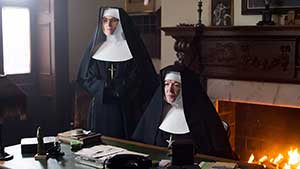You did one heck of a job playing the nasty nun, Sister Hildegarde McNulty. I'll admit, I applauded her eventual comeuppance - maybe a little too loudly. A woman in front of me turned around and gave me the stink-eye. Not that I cared much. I'm a lapsed Catholic, and I was raised in a devout extended family that included my stern paternal grandmother who eventually ran away from home to join the Convent and several other aunts who were also married to Christ. Everything was always a little too judgey for my taste, despite all the "good" Catholic rhetoric. Sister Hildegarde is definitely the face of those old ways. She's devout, but too feeble to win a fist fight, yet the tongue lashings never lose their sting. She's also one of the most interesting characters, despite her limited screen time.
While prepping for this film, based on Philomena's true story, you must have uncovered some fascinating information about Sister Hildegarde's past. Who was she, really? On one hand, she may have reunited Irish mothers and children that were separated in the mid 1900s. On the other hand, she apparently destroyed evidence about backroom adoption dealings for wealthy overseas couples who could easily afford a young, healthy white child. So like most humans, she was likely part saint and part sinner.
Regardless, Philomena needed a juicy antagonist and that's what you delivered. See, Philomena Lee (Judi Dench) is depicted as someone as innocent as they come. But after becoming pregnant from a brief fling, her world is turned upside down. As an older woman fifty years later, Philomena continues to look back with regret and wonders, "what happened to my child?".
Through a series of fortunate events, her daughter Jane (Anna Maxwell Martin) meets the journalist Martin Sixsmith (Steve Coogan). He initially doesn't want to take on the "human interest story" but finds selfish motivations to give Philomena a chance to look for her son, Anthony. As they retrace her steps, Philomena remembers the tender moments and the trauma of being forced to give away her boy to the Sisters in the Convent (including, of course, Sister Hildegarde). As I'm sure you know, young women didn't have many choices when it came to having babies out of wedlock during that time. No one thought an unwed mother would be suitable wife material for the marriage bed. And, young women were to be punished for their transgressions.
Philomena's story takes her to America and eventually back to the Convent. There she comes to realize that the nuns had a chance to change her life, and didn't. That's the real tragedy of this story. And yet, despite everything, Philomena's ability to forgive the suffering caused to her is powerful.
Back at the Convent is also where we see your portrayal of Sister Hildegarde. Your representation is about what I would imagine it to be in this situation, along with the ability to still spew venomous beliefs in Philomena's face after all those years. It's in direct contrast to Sixsmith's protective nature of Philomena. But, as it turns out, after I did some reading, the real Sister Hildegarde died well before Philomena met Sixsmith. So, for the quarrel between Philomena, Sixsmith and Sister Hildegarde, you and director Stephen Frears worked "off book" so to speak (not following the original source material, a book called The Lost Child of Philomena Lee). Still, you brought a realistic quality to Sister Hildegarde as a woman who believed that women like Philomena were sinners of the highest order.
I'm not sure that Philomena will win any major awards, but it's an important story to be a part of nonetheless. A story about how far we've come as women in a mere fifty years or so. A bittersweet story of regret and forgiveness. All those things we love about a "human interest story" that may have never seen the light of day if it weren't for a series of fortunate meetings.
Stay true to the character, always!
Yours,
Jennifer







